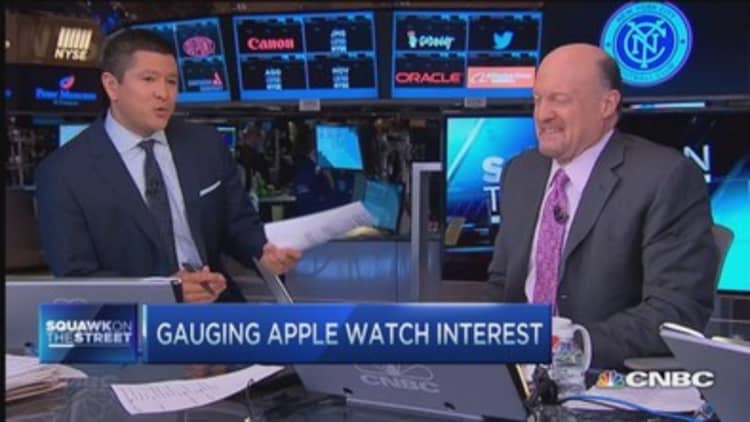While there may be a time when people are constantly glancing at their wrists in lieu of staring at smartphones, don't expect that day to come very soon.
On April 24, the release date of Apple's much-anticipated smartwatch, only 3.2 percent of consumers are planning to brave the crowds and purchase the device, according to a poll conducted for CNBC.com. And fewer than 10 percent are even "somewhat likely" to buy the Apple Watch in the next six months.
The survey of 505 people in the U.S. age 18 or older was taken from April 8-13, and has a margin of error of about 4.4 percent. Respondents were selected to mirror the age and gender proportion of U.S. adults. The poll was conducted using SurveyMonkey Audience.
Read MoreWhy the Apple Watch isn't called the iWatch
Not that Apple executives will be sweating out the early days. This is a company, after all, that counts on its loyal fanbase to gobble up initial product releases (remember the iPod and iPhone?) before adding loads of features and dropping prices for the wider public.
Piper Jaffray analyst Gene Munster expects opening weekend sales, including preorders, of 1 million Apple Watches. Within six quarters, he predicts the product will account for 10 percent or more of the company's revenue.
The watch is different than anything Apple has sold before, and the company is staffing up in stores to train consumers on how to use it. The Apple Watch has to be tethered to an iPhone and has different input mechanisms than the classic swipe and pinch used on the iPhone and iPad.
"The whole idea of training the first people buying it is that they're training an evangelist sales force," said Mike Wehrs, head of U.S. operations for Appster, an app-development company. "When Apple removes restrictions and lets anyone buy it, they'll have a large number of people who know how to use it."
The Cupertino, California-based company has plenty of competition in the smartwatch market, but the bigger hurdle in getting mass adoption is convincing consumers that they need yet another Web-connected mobile device.
Almost 18 percent of survey respondents said the Apple Watch is the smartwatch they'd be most likely to buy, which was higher than the Fitbit at 9.5 percent, Samsung Gear at 4 percent and Android Wear at 3.8 percent. But 58 percent of those surveyed said they are "not likely to ever buy a smartwatch." (Tweet This)
An Apple spokesperson didn't respond to a request for comment.

The biggest factor keeping people from buying an Apple Watch is price, the favored response by 45 percent of people. The Sport model starts at $349. About 12 percent of respondents said they don't wear watches, 11 percent said they're not Apple users and 9.9 percent said they don't have iPhones.
Among 20 watch features, the one that respondents would be most excited to try if they had the device is the activity tracker, favored by 18 percent, followed by the workout app at 13 percent and maps at 9.7 percent.
As for the feature that consumers said they'd use the most, close to 30 percent chose a function that hardly differentiates the Apple Watch from the competition, or any other watch for that matter: checking the time.


